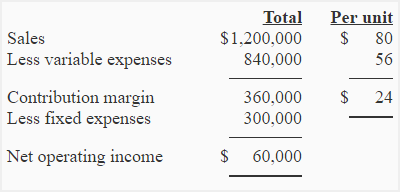Exercise-5 (CM ratio, break-even analysis, target profit analysis, margin of safety)
Following is the contribution margin income statement of a single product company:

Required:
- Calculate break-even point in units and dollars.
- What is the contribution margin at break-even point?
- Compute the number of units to be sold to earn a profit of $36,000.
- Compute the margin of safety using original data.
- Compute CM ratio. Compute the expected increase in monthly net operating if sales increase by $160,000 and fixed expenses do not change.
Solution:
(1) Break-even point in units and dollars:
Fixed expenses/Unit contribution margin
$300,000/$24
12,500 units
or
(12,500 units × $80) = $1,000,000
(2) Contribution margin at break-even point:
Contribution margin must be $300,000 at break-even point because it will cover fixed costs and nothing will remain to go towards profit.
(3) Computation of target profit:
(Fixed expenses + Target profit)/Unit contribution margin
($300,000 + $36,000)/$24
Company must sell 14,000 units of product to earn a target profit of $36,000.
(4) Margin of safety in dollars and percentage:
Margin of safety in dollars = Actual or budgeted sales – sales required to break-even
$1,200,000 – $1,000,000
$200,000
or
Margin of safety in percentage = Margin of safety in dollars/Actual or budgeted sales
= $200,000/$1,200,000
=0.1667 or 16.67%
(5) CM ratio and expected change in net operating income:
Contribution margin/Total sales
= $360,000/$1,200,000
= 0.30 or 30%
If the sales are increased by $160,000 without any change in fixed expenses, the net operating income will be increased by $48,000 as computed below:
$160,000 × CM ratio
$160,000 × 0.3
= $48,000

BEP( units) = FC/ contribution margin per units
300000/24= 12500 units.
BEP ( value) = FC/ CMR
CMR=sales- vc/ sales.
1200000-840000/1200000=0.3
300000/0.3=$1000000.